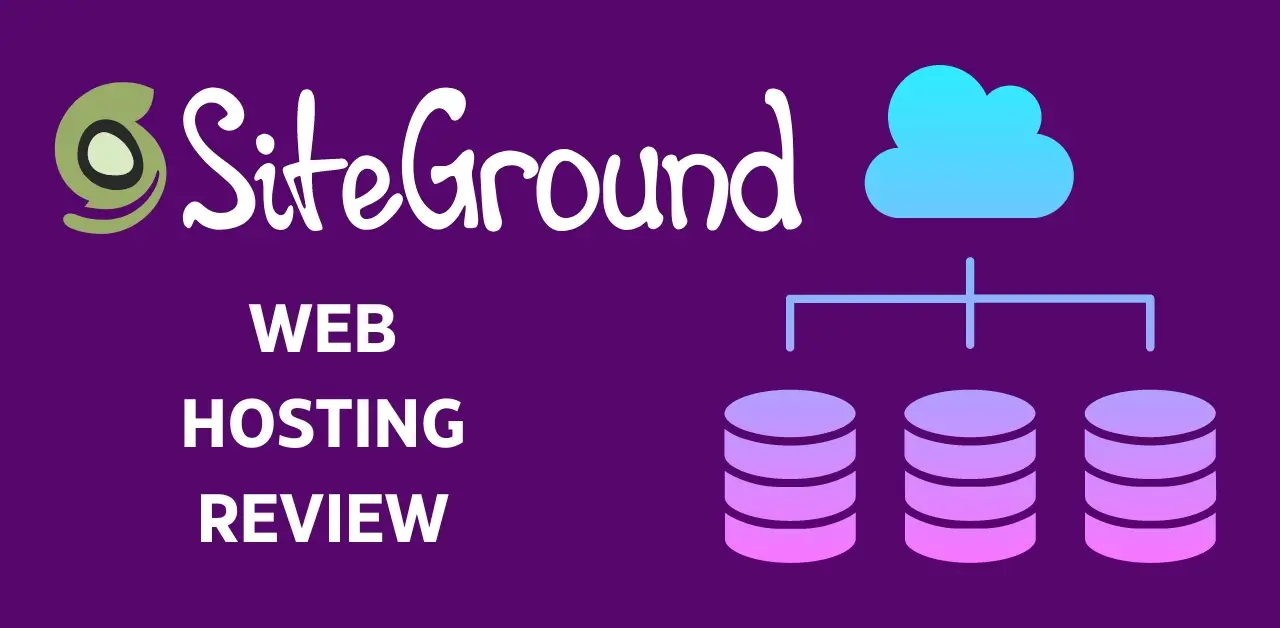
When it comes to web hosting, SiteGround is a name that frequently pops up as one of the top contenders. Whether you’re a beginner building your first website or a seasoned professional managing multiple sites, choosing the right web host is crucial. SiteGround has carved out a reputation for providing reliable, fast, and secure hosting services. But how does it really stack up? In this review we’ll discuss SiteGround Web Hosting, we’ll dive deep into SiteGround’s features, performance, pricing, and support, to help you decide if it’s the right hosting provider for you.
Key Features of SiteGround Hosting
Performance and Speed
One of the most important factors in choosing a web host is performance, and SiteGround excels in this area. The company utilizes Google Cloud infrastructure to ensure top-notch speed and reliability. With SSD storage, PHP 8.0, and a free CDN (Content Delivery Network) included in all plans, SiteGround makes sure your website runs quickly and efficiently.
Uptime Guarantee
Uptime is another critical feature to consider. SiteGround boasts a 99.99% uptime guarantee, meaning your site will rarely, if ever, go down. This is especially important for businesses that can’t afford to lose visitors due to server downtime. Over the years, SiteGround has maintained an excellent track record for uptime, thanks to its proactive monitoring and AI-driven tools.
SiteGround’s User-Friendly Interface
cPanel Alternatives
Unlike many hosting providers that rely on cPanel, SiteGround offers its own custom control panel. This interface is designed with simplicity in mind, making it incredibly easy for both beginners and experienced users to manage their websites. From setting up emails to handling databases, everything is intuitive and user-friendly.
One-Click Installations
For those who use WordPress, Joomla, or other CMS platforms, SiteGround provides easy one-click installations. You won’t need to deal with complicated setup processes, as everything is automated, allowing you to get your site up and running in just a few clicks.
Security Features
Free SSL Certificates
Security is a top priority for SiteGround, and every hosting plan includes a free SSL certificate. SSL (Secure Socket Layer) encrypts data transferred between your website and its visitors, making your site more secure. You can easily activate the SSL with a single click from your SiteGround dashboard.
Daily Backups
SiteGround automatically performs daily backups of your website, so you don’t need to worry about losing data. If something goes wrong, you can restore your site from the previous day’s backup with minimal hassle. This feature is incredibly valuable, especially for e-commerce websites or blogs that update frequently.
Advanced Security Tools
SiteGround also offers advanced security features like AI-driven anti-bot systems, firewalls, and proactive server monitoring. These tools work behind the scenes to block malicious traffic and potential threats, ensuring your website remains safe from hackers.
Visit SiteGround Website for more Details
SiteGround web hosting plans
StartUp
-
1 website
-
10 GB Web Space
-
10,000 Visits Monthly Unmetered Traffic
GrowBig
-
Unlimited Websites
-
20 GB Web Space
-
100,000 Visits Monthly Unmetered Traffic
GoGeek
-
Unlimited Websites
-
40 GB Web Space
-
400,000 Visits Monthly Unmetered Traffic
Essential Features
- Free SSL
- Free Email
- Free Email Migrator
- Unlimited Databases
- Free CDN
- Daily Backup
- Enhanced Security
- Out-of-The-Box Caching
- 100% Renewable Energy Match
- 30-Days Money-Back
- Add Collaborators
Managed WordPress Features
- Free WP Auto-Install
- Free WP Auto-Migrator
- WordPress Autoupdates
- Speed Optimizer WP Plugin
- Security Optimizer WP Plugin
- WooCommerce Enabled
- WP-CLI and SSH
Essential Features
- Free SSL
- Free Email
- Free Email Migrator
- Unlimited Databases
- Free CDN
- Daily Backup
- Enhanced Security
- Out-of-The-Box Caching
- 100% Renewable Energy Match
- 30-Days Money-Back
- Add Collaborators
Managed WordPress Features
- Free WP Auto-Install
- Free WP Auto-Migrator
- WordPress Autoupdates
- Speed Optimizer WP Plugin
- Security Optimizer WP Plugin
- WooCommerce Enabled
- WP-CLI and SSH
Exclusive Features
- On-demand Backup Copies
- 30% faster PHP
- Staging
Essential Features
- Free SSL
- Free Email
- Free Email Migrator
- Unlimited Databases
- Free CDN
- Daily Backup
- Enhanced Security
- Out-of-The-Box Caching
- 100% Renewable Energy Match
- 30-Days Money-Back
- Add Collaborators
Managed WordPress Features
- Free WP Auto-Install
- Free WP Auto-Migrator
- WordPress Autoupdates
- Speed Optimizer WP Plugin
- Security Optimizer WP Plugin
- WooCommerce Enabled
- WP-CLI and SSH
Exclusive Features
- On-demand Backup Copies
- 30% faster PHP
- Staging + Git
- White-Label Clients
- Free Private DNS
- Highest Tier of Resources
- Priority Support
SiteGround Web Hosting with Competitors
When choosing a web hosting provider, it’s essential to compare features, pricing, and overall value with the competition. SiteGround, known for its reliability, speed, and customer support, competes with some of the biggest names in the industry, such as Bluehost, HostGator, and A2 Hosting. Here’s a detailed comparison between SiteGround and its top competitors.
1. Performance and Speed
SiteGround:
SiteGround’s performance is top-tier, thanks to its use of Google Cloud infrastructure, SSD storage, and a free Content Delivery Network (CDN) for all users. It also supports the latest PHP 8.0, which enhances website speed and efficiency. SiteGround is well-regarded for its fast page load times and reliable server response times.
Bluehost:
Bluehost offers solid performance but doesn’t quite match SiteGround’s speeds. While it also includes SSD storage and Cloudflare CDN, it doesn’t leverage the Google Cloud infrastructure, which can result in slightly slower speeds for websites with higher traffic.
HostGator:
HostGator’s performance is reliable, but it lacks the advanced technologies that SiteGround uses, like the Google Cloud platform and AI-driven systems. HostGator offers slower server response times, especially under heavy traffic, which may not be ideal for websites with large visitor numbers.
A2 Hosting:
A2 Hosting focuses on speed and performance, offering Turbo Servers that claim to deliver up to 20x faster loading times. In some tests, A2 Hosting outperforms SiteGround in raw speed, but the difference may not be noticeable for most users, especially since SiteGround uses multiple speed optimization techniques.
Verdict:
If you’re prioritizing performance and speed, SiteGround stands out for its Google Cloud integration and cutting-edge technology, but A2 Hosting is a close competitor for pure speed.
2. Uptime and Reliability
SiteGround:
SiteGround offers a 99.99% uptime guarantee and has an excellent track record in maintaining this promise. Its advanced monitoring systems and AI-based security protocols help keep downtime to an absolute minimum, which is crucial for business and e-commerce websites.
Bluehost:
Bluehost guarantees a 99.9% uptime, which is generally reliable. However, some users have reported occasional downtime, particularly during server maintenance or updates.
HostGator:
HostGator also promises 99.9% uptime but has had more frequent issues with downtime compared to SiteGround. It’s generally reliable but may not be as consistent as some of the other providers.
A2 Hosting:
A2 Hosting has a reputation for strong uptime, offering a 99.9% uptime guarantee, similar to Bluehost and HostGator. However, like SiteGround, it excels in preventing downtime through proactive server monitoring.
Verdict:
In terms of uptime and reliability, SiteGround leads the pack with its impressive track record of 99.99% uptime, giving it an edge over its competitors.
3. Ease of Use and Interface
SiteGround:
SiteGround uses its own custom interface rather than the traditional cPanel, making it easier for beginners to navigate. The interface is clean, user-friendly, and includes one-click installations for popular platforms like WordPress.
Bluehost:
Bluehost also offers a beginner-friendly dashboard, but it still relies heavily on cPanel, which may not be as intuitive for some users. However, Bluehost does integrate well with WordPress, making it a popular choice for WordPress users.
HostGator:
HostGator uses cPanel for its interface, which is functional but not as modern or user-friendly as SiteGround’s custom dashboard. While it gets the job done, the interface can feel outdated for those who prefer a more streamlined experience.
A2 Hosting:
A2 Hosting offers both cPanel and Plesk control panels. It’s a solid choice for experienced users but might feel a bit overwhelming for beginners compared to SiteGround’s simplified approach
Verdict:
For ease of use and interface design, SiteGround provides a more intuitive experience with its custom dashboard, making it a top choice for both beginners and advanced users.
4. Security Features
SiteGround:
SiteGround is known for its advanced security features, which include free SSL certificates, daily backups, AI-driven anti-bot systems, and proactive server monitoring. The company offers a robust security package, especially for WordPress users.
Bluehost:
Bluehost includes a free SSL certificate and some basic security features, but it lacks the more advanced tools that SiteGround provides, such as AI-powered monitoring and daily backups on all plans.
HostGator:
HostGator also includes a free SSL certificate and automatic backups, but its security measures aren’t as comprehensive as SiteGround’s, particularly when it comes to real-time monitoring and firewall protection.
A2 Hosting:
A2 Hosting excels in security, with features like free HackScan protection, KernelCare rebootless updates, and DDoS protection. Like SiteGround, A2 Hosting takes security seriously, offering robust protection against potential threats.
Verdict:
Both SiteGround and A2 Hosting are highly secure, but SiteGround stands out for its AI-driven monitoring and daily backups, giving it a slight edge for users prioritizing security.
5. Customer Support
SiteGround:
SiteGround has a stellar reputation for its 24/7 customer support, available via live chat, phone, and tickets. Their support team is knowledgeable, responsive, and consistently receives positive feedback from users.
Bluehost:
Bluehost offers 24/7 customer support through live chat and phone, but user experiences can be mixed. Some customers report long wait times or unhelpful responses, though overall, the service is considered reliable.
HostGator:
HostGator also offers 24/7 support, but like Bluehost, user experiences can vary. Some users report great service, while others have faced delays or challenges in resolving their issues.
A2 Hosting:
A2 Hosting provides 24/7/365 support through phone, live chat, and email. Their support is generally well-reviewed, with a focus on solving technical issues quickly and efficiently.
Verdict:
While all competitors offer 24/7 support, SiteGround consistently receives the highest praise for customer service, making it the best choice for users who value excellent support.
6. Pricing and Renewal Costs

SiteGround:
SiteGround’s initial pricing is competitive, but its renewal rates are significantly higher, which can be a drawback for budget-conscious users. However, the quality of service often justifies the price hike.
Bluehost:
Bluehost offers lower introductory pricing, making it an appealing option for beginners. Like SiteGround, renewal rates increase, but they remain more affordable than SiteGround’s.
HostGator:
HostGator provides some of the lowest initial prices in the industry, and while its renewal rates increase, they are still lower than those of SiteGround and comparable to Bluehost.
A2 Hosting:
A2 Hosting’s pricing is similar to SiteGround’s, with competitive initial rates and higher renewal prices. However, it offers more frequent discounts and promotions, which can help offset costs.
Verdict:
For budget-conscious users, HostGator and Bluehost may be more attractive options due to their lower renewal rates. SiteGround and A2 Hosting are more expensive but offer better performance, security, and support.
Which Host is Best?
- Best for Performance and Reliability: SiteGround
- Best for Speed: A2 Hosting
- Best for Beginners: SiteGround and Bluehost
- Best for Budget-Friendly Pricing: HostGator
- Best for Security: SiteGround and A2 Hosting
- Best for Customer Support: SiteGround
Ultimately, SiteGround shines in areas like performance, security, and customer support. While it may be pricier than some competitors, the higher cost is often justified by its excellent service quality and reliability. A2 Hosting is a strong alternative for those who prioritize speed and security, while HostGator and Bluehost are more affordable options for users on a budget.
SiteGround’s Pros and Cons
- Excellent performance and uptime.
- User-friendly interface and one-click installations.
- Strong security features, including free SSL and daily backups.
- Top-tier customer support with 24/7 availability.
- Higher renewal prices compared to initial sign-up rates.
- Limited storage on lower-tier plans.
Who Should Choose SiteGround?
SiteGround is an excellent choice for small business owners, bloggers, and developers looking for reliable hosting with top-notch customer service. Its performance and security features make it a great option for e-commerce sites and larger projects as well. If you need a web host that can grow with your site, SiteGround’s scalability options make it a solid choice.
How to Get Started with SiteGround
Getting started with SiteGround is simple. Visit their website, choose a hosting plan that fits your needs, and complete the sign-up process. Once you’ve purchased a plan, you can easily set up your website using their custom dashboard and one-click installations.
Conclusion
SiteGround is a powerful and reliable web hosting provider that stands out for its performance, security, and excellent customer support. While it may come with higher renewal costs, the value you get in return makes it well worth the investment. Whether you’re just starting out or managing a large, high-traffic site, SiteGround has the tools and features to support your website’s growth.
Our Rating: 4.4/5 ⭐
FAQ'S
Yes, SiteGround offers reliable hosting with excellent performance, security, and customer support, especially for WordPress users.
SiteGround generally offers better performance and support, while HostGator is more budget-friendly with larger storage options.
WP Engine, Kinsta, and Bluehost are often considered better for premium managed WordPress hosting, depending on specific needs.
Yes, SiteGround is beginner-friendly, with an easy-to-use interface and one-click installations for CMS platforms like WordPress.
No, SiteGround does not offer free domain registration. You will need to purchase a domain separately.
SiteGround offers a 30-day money-back guarantee for its shared hosting plans, giving you time to test the service risk-free.
Yes, SiteGround allows you to upgrade your hosting plan as your website grows, offering seamless transitions to higher-tier plans.



